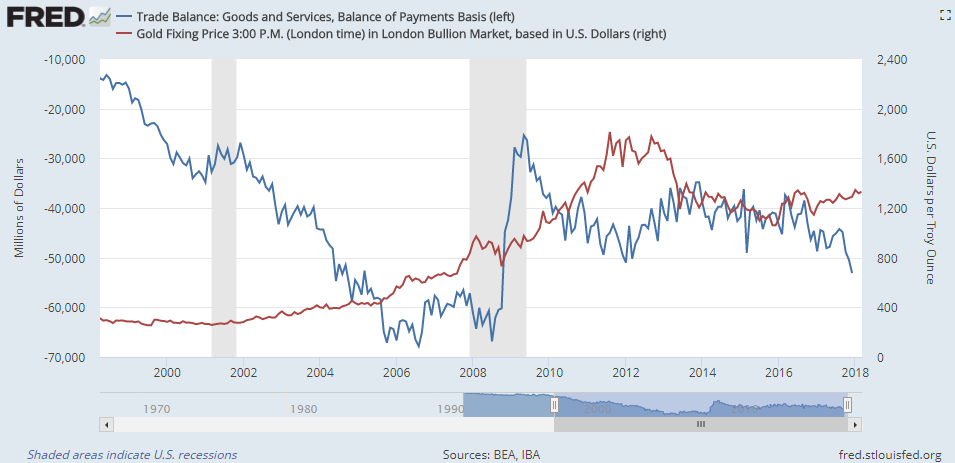
'Red Hot' US Jobs Data See Gold Bullion Lose 1-Week High as 'Trade War' Hits Yen, Beijing
GOLD BULLION slipped against a weakening Dollar in London trade Wednesday, retreating $10 from a 1-week high at $1340 per ounce as talk of a global ‘trade war’ spurred by US President Donald Trump grew yet again following the resignation of his top economic advisor, Gary Cohn.
After new data showed US factory orders falling steeper than expected in January, private-sector payrolls provider ADP today said the world’s largest economy added more jobs than analysts forecast in February, with January’s figure also revised higher.
“The [US] job market is red hot and threatens to overheat…with government spending increases and tax cuts,” says rating agency Moody’s chief economist Mark Zandi.
Major government bond prices rose, nudging interest rates lower, as European equities held flat and Asian stock markets closed the day around 1% down.
“There is now no one with the ear of the president who is a supporter of the existing trade system,” says Council on Foreign Relations trade specialist Edward Alden.
“Trump will likely feel liberated by [ex-Goldman Sachs banker Cohn’s exit]…It will only reinforce his own protectionist convictions.”
No.2 gold-mining nation Australia – set for new record-high bullion output in 2018 according to consultants Surbiton Associates – meantime revised its end-2017 GDP growth lower on Wednesday to 2.4% per year.
Japan’s economic indicators index for February fell to an 8-month low, falling at the fastest pace since the earthquake, tsunami and nuclear disaster of March 2011.
“In Asia today gold opened $4 higher as USD/JPY plunged below ¥106,” says a trading note from Swiss refiners and finance group MKS Pamp, pointing the Dollar’s sharp overnight fall versus the Yen.
Bank of Japan chief Haruhiko Kuroda last week hinted that Tokyo may be preparing to cut its massive QE stimulus program, “but the central bank has every interest in seeking a weak Yen,” says a column at Bloomberg today, noting that “Japanese corporate earnings are highly cyclical [and] a strengthening Yen can cause stocks to plunge, depressing consumption and tipping the economy back into deflation.”
The Bank of Japan next announces monetary policy this Friday.

“The [gold bullion] market tested the $1340 level a couple of times during the [Asian] morning,” MKS goes on, “but drifted lower on Chinese selling.
“We would expect to see buying interest…at $1320-25.”
China’s national gold bullion reserves were today reported as unchanged by weight for last month, down 2.0% by value in line with global Dollar prices.
China’s total central-bank reserves of foreign currency fell to $3.134 trillion, down $27bn in for the first drop in 13 months as the Dollar strengthened in February.
Trade data from China – the world’s No.2 exporter of goods behind Germany – are due tomorrow.
“The Trump administration is playing hardball with Beijing,” says the South China Morning Post, reporting that the number of officials on last month’s trade delegation to Washington was just a quarter of what China planned following objections from the White House.
“China is learning the hard way that this administration may not be the pushover that Chinese officials had come to believe it was,” Bloomberg quotes former IMF China specialist Eswar Prasad.
“They may be forced to offer substantive concessions in order to keep the bilateral economic relationship on an even keel.”
France’s exports fell hard in January new data said Wednesday, widening the No.2 Eurozone economy’s trade deficit.
UK house prices rose last month at the slowest pace in 5 years according to mortgage lender Halifax.
Disclaimer
This publication is for education purposes only and should not be considered either general of personal advice. It does not consider any particular person’s investment objectives, financial situation or needs. Accordingly, no recommendation (expressed or implied) or other information contained in this report should be acted upon without the appropriateness of that information having regard to those factors. You should assess whether or not the information contained herein is appropriate to your individual financial circumstances and goals before making an investment decision, or seek the help the of a licensed financial adviser. Performance is historical, performance may vary, past performance is not necessarily indicative of future performance. This report was produced in conjunction with ABC Bullion NSW.








